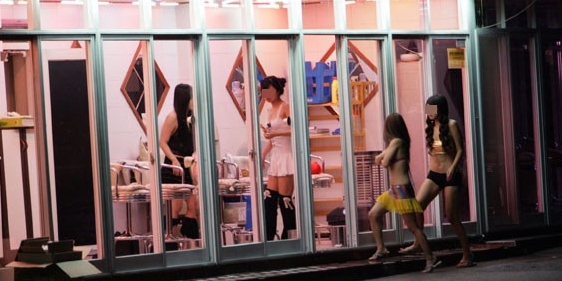These South Korean females stand in “window shops” where men can look and choose one for sexual services. (Photo via here.)
by RUTH KIM
Beneath South Korea’s facade of conservatism, sheen of K-pop stardom and triumphs in technology thrives a seedy underbelly of illegal prostitution, new data reveals. And according to South Korean media, Korean firms are the ones keeping the sexual entertainment industry not only afloat, but flourishing.
A report from the National Tax Service reveals that the annual usage of Korean corporate credit cards spent at hostess bars and other establishments widely known to include prostitutes as part of the “entertainment” amounted to more than $1 billion in 2013, according to The Korea Observer.
These hostess bars take the forms of noraebangs (karaoke bars), massage parlors and salons, “kiss rooms” or “room salons,” to name a few, according to a rather detailed catalog on a Reddit thread.
According to the 2013 report released Monday by Rep. Park Myung-Jae of the Saenuri Party, businesses spent $733.1 million with corporate credit cards at “room salons,” $206.9 million at karaoke bars with hostesses, and $100 million at yojeong, a place where the women dress in traditional Korean hanbok.
Companies also spent nearly $40 million and $130 million at nightclubs and for performance bars, respectively.
Unfortunately, prostitution and sexual entertainment in South Korea are not a new trend. The International Business Times reported that 1 in 5 South Korean men in their 20s regularly buy sex, at least four times a month, according to the government-run Korean Institute of Criminology. Meanwhile, the government’s Ministry for Gender Equality reports that about 500,000 women work in the sex industry, though the Korean Feminist Association says that figure is closer to 1 million, according to the IB Times article.
There have been efforts on the part of the South Korean government to curtail prostitution. In 2004, lawmakers passed the Special Law on Sex Trade, which banned the selling and buying of sex and shut down brothels. According to the International Business Times, the Ministry for Gender Equality offered cash incentives in 2006 to companies that abstained from buying sex services for office parties and business trips.
At the same time, critics say the government has mostly turned a blind eye toward the industry because it’s so lucrative. The government once admitted that as much as 4 percent of South Korean’s annual gross domestic product is due to the sex trade, and in 2009, the Lee Myung-bak administration axed a regulation that required companies’ explanations on entertainment expenses that exceeded $500,000 in order to boost a declining economy.
The problem of prostitution is not new, but its implications are ever pressing. Child and teen prostitution is on the rise in South Korea, involving many young Korean runaways. And the entertainment world, with all of its glamour of K-pop and popular dramas, also seems to be a cesspool for the sexual service industry (both consensual and forced). Actress Jang Ja-yeon’s tragic suicide in 2009 is one prime example of this issue–in her suicide note, she said she was forced to provide sexual favors to 30 influential men in the industry.







